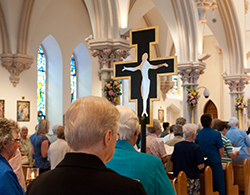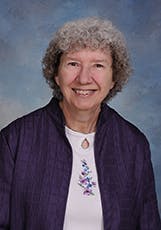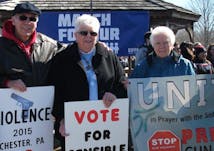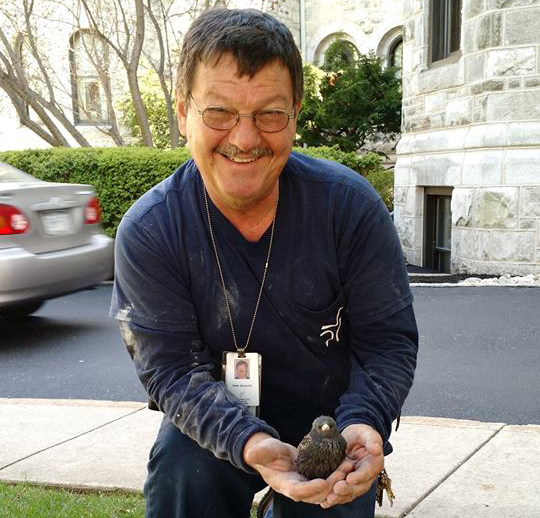Milestone CSR Actions and Progress to Which Those Actions Contributed
1974
- The General Council of the Sisters of St. Francis of Philadelphia establishes the congregation’s investment portfolio.
1979
- The congregation joins the Philadelphia Area Coalition for Responsible Investment (PACRI).
1980
- The Sisters of St. Francis of Philadelphia establish their Office of Corporate Social Responsibility (CSR) and Committee for Responsible Investment.
1981
- PACRI joins the Interfaith Center for Corporate Responsibility (ICCR) and files the first shareholder resolutions with General Electric (GE) and AT&T on nuclear weapons production.
1982
- Rationale is developed for divestment from corporations that contribute to nuclear arms buildup.
1983
- The Sisters of St. Francis of Philadelphia publicly divest from nuclear weapons contractors. CSR gives presentations throughout the congregation on corporate responsibility.
1985
- The first alternative investment is made to Philadelphians Concerned About Housing.
1987
- Divestment from South African stock is completed. Shell Oil, Texaco, and Mobil are boycotted.
1988
- Nestlé and GE are boycotted. Neumann College joins PACRI.
1989
- Divestment from tobacco companies is completed.
1992
- GE’s CEO, Jack Welch, helicopters to Aston, Pennsylvania, to attend a meeting about economic conversion.
- The Restricted Investment List is started.
1993
- CSR is instrumental in obtaining Sun Oil endorsement of CERES environmental principals—the first oil company to make the endorsement.
- Restrictions are lifted on investment in South Africa and the GE boycott ends. A goal is established for community-development investment at 2% of the total portfolio.
1997
- The Corporate Social Responsibility director, Doris Gormley is featured in The New York Times in an article about controversy spurred by a CEO’s very public objection to being called to include women and minorities as board members.
1998
- The National Labor Committee presents Congress with a petition bearing 250,000 signatures—including many from the Sisters of St. Francis of Philadelphia—to end child labor and sweatshop abuses.
1999
- The Ceres Principles are endorsed by American Airlines; the MacBride Principles are endorsed by GE, Toys “R” Us, and other companies.
2000
- The Sisters of St. Francis of Philadelphia enable a substantial breakthrough in Coca-Cola’s approach to policy change.
2002
- Our active advocacy efforts with the Tri-State Coalition lead to the EPA signing the Record of Division (ROD), holding GE accountable for the cleanup of toxic waste in the Hudson River at a cost to GE of more than $500 million.
2003
- As a result of many years of work on the tobacco issue, a Framework Convention on Tobacco Control (FCTC) by the World Health Organization (WHO) is adopted; 172 countries agreed to the adoption—the first global health treaty of any kind.
2004
- Our Schering Plough resolution on access and affordability regarding health care is withdrawn. The company allocates $30,000 in grant money toward treatment of hepatitis C in Newark, New Jersey, which has one of the highest hepatitis C rates in the nation.
- The Sisters of St. Francis are very active in establishing more effective rating and monitoring systems for violent video games. We initiate a letter-writing campaign, write an article published in the National Catholic Education Association (NCEA) magazine, and participate in many dialogues with retail companies.
- The community-development investment goal is revised to 2.5% of the total portfolio.
2005
- The Sisters of St. Francis of Philadelphia file a resolution with Textron requesting the board establish a policy that separates the roles of chairperson and CEO. The resolution passes with a vote of 51.4%.
- The 34th Annual General Meeting of ICCR is hosted at Our Lady of Angels Convent and the Franciscan Spiritual Center in June 2005—the first time an annual meeting is held in the Philadelphia region.
2006
- The Sisters of St. Francis of Philadelphia continue to play an active role in addressing violence in video games by way of parent/teacher presentations, Senate hearings, and communication with the media, families, the Federal Trade Commission, and the American Psychological Association.
- The Sisters of St. Francis of Philadelphia are the primary filers of a resolution on diversity and violence in one of Lockheed Martin’s workplaces. The resolution receives an astounding 19.39% of the vote at the 2006 annual meeting. Lockheed Martin participates in a very effective dialogue.
2007
- The Sisters of St. Francis of Philadelphia receive special commendation from ICCR for being one of the most active filers—filing or cofiling more than 30 resolutions and participating in more than 30 corporate dialogues.
2008
- As active members of a human trafficking subcommittee of ICCR, the Sisters of St. Francis ask hotel chains, cruise lines, and airlines to adopt the End Child Prostitution and Trafficking Code (ECPAT Code) preventing sexual exploitation of minors on company premises.
- The Sisters of St. Francis of Philadelphia join the Investor Environmental Health Network (IEHN); the Center for Health, Environment, and Justice (CHEJ); and other shareholders to address the issue of polyvinyl chloride (PVC) with many companies.
2009
- The Sisters of St. Francis are the primary filers of resolutions on predatory credit-card practices at Citigroup and are coleaders with Domini Social Investments at Bank of America. The Citigroup resolution receives a 26.41% vote and the Bank of America resolution a 33.38% vote. These actions will enable the passage of the Credit Cardholders’ Bill of Rights of 2010.
- Our letters written to Sunoco cause the company to change their policy on BPA, a controversial plastic chemical.
2010
- Mercy Investment Services and the Sisters of St. Francis of Philadelphia file a resolution with Delta Airlines on the ECPAT Code. We withdraw the resolution when Delta agrees to sign the code, which Delta does officially in March 2011.
- We file a pay-disparity resolution with Goldman Sachs that calls for adherence to ethical and moral standards in the wake of inequity and injustice for workers.
- We visit communities in Western Pennsylvania to begin our advocacy on hydraulic fracturing.
2011
- The pay disparity resolution of 2010 brings about international publicity on the issue, including coverage by The Guardian and The New York Times.
- Sister Nora Nash is interviewed on National Public Radio’s Radio Times. The December 6, 2011, segment is titled “Having faith in corporate social responsibility.”
- Our primary filing of the resolution Risk Evaluation: Childhood Obesity gives further motivation to McDonald’s in changing their Happy Meals for children. Coverage includes a Time article.
2012
- For a second year, we lead the filing—with 23 other ICCR/IEHN cofilers—of a resolution with Chevron on the community impacts of hydraulic fracturing; the resolution receives 27.90% of the vote. Chevron requests a meeting at Our Lady of Angels Convent (OLA) in December 2012; a more open dialogue ensues.
- Our participation in active dialogues led by the Tri-State Coalition and Everence persuade Hershey to produce one item (Bliss Chocolate) child labor free.
- We file a resolution asking Walgreens to form an ethics committee on the appropriateness of selling cigarettes in pharmacies. The resolution is withdrawn in favor of a dialogue hosted at OLA. The company promises a follow-up meeting in 2013. The work of the Sisters of St. Francis is credited by the Chicago Tribune.
2013
- Once again, the Sisters of St. Francis are the primary filer of a resolution with Chevron—Quantitative Risk Management Reporting for Shale Energy Operations, which receives 30.20% of the vote. We have 27 ICCR/IEHN cofilers joining us in this issue of hydraulic fracturing. We have responses from upper management and expect more quantitative reporting.
- Another first at OLA is a meeting with Family Dollar on February 14, 2013. The company gives an extended presentation about their corporate report. They are very receptive to addressing a human rights policy and agree to journey with us as they become more transparent on a variety of issues.
- Hershey announces its 21st Century Cocoa Plan on a day that the Tri-State Coalition, Everence, and the Sisters of St. Francis of Philadelphia are present for a Hershey shareholder meeting.
- The Wells Fargo resolution on payday lending does not pass the SEC, but our diligent work with the Center for Responsible Lending and 30 other ICCR members has drawn the attention of the regulatory agencies.
2014
- One month after we file a resolution, Wells Fargo announces that they are ending their Direct Deposit Advance Program. Our letters and dialogues over the past two years on this issue have paid off. This bank decision has also been brought about by pressure from other ICCR members and the Consumer Financial Protection Bureau (CFPB). An ICCR press release details this success.
- Anadarko Petroleum Corporation sends representatives to meet at Our Lady of Angels Convent on November 17, 2013, and presents the company’s first corporate report and a first draft of a human rights policy.
- Sr. Nora Nash receives the ICCR Legacy Award.
- An ICCR bank survey of six major banks is completed with the active participation of the Sisters of St. Francis. Wells Fargo receives the lowest rating.
2015
- Along with the Congregation of Benedictine Sisters, we file a shareholder resolution resulting in a dialogue with the McDonald’s Corporation. The company commits to no longer purchasing chicken treated with antibiotics that are also used in human medicine. Read more.
- Sr. Nora Nash is the subject of an article in the February 2015 GreenMoney Icons Interview Series.
- Our 2015 fracking resolution with Chevron garners 28.6% of the vote at the annual general meeting. The company takes some steps to provide quantitative data on several serious community and environmental issues. We will file another resolution in 2016.
- On July 9, 2015, The Wall Street Journal publishes an article entitled “Pope Francis Inspires Catholic Investors to Press Environmental Concerns.” Sr. Nora Nash is featured in the article.
2016
- Aramark joins the Food Waste Reduction Alliance and becomes a “best practices” company in the area of food waste. Aramark shares their innovations with other companies.
- Bristol-Myers Squibb reveals in dialogue that they have completed negotiations with the Medicines Patent Pool to allow the company’s hepatitis C drug to be accessed in low- and middle-income countries.
- Hormel Foods begins a pilot program for raising pigs without the use of antibiotics and partners with George Washington University in a similar pilot. The company will no longer use antibiotics for growth or use gestation crates. Their subsidiary Jenny-O pilots a similar program for raising turkeys.
2017
- After dialogue, Bank of America announces it is phasing out its coal portfolio and is placing a major emphasis on environmental, social, and governance (ESG) risks. Read more.
- Delta Airlines launches a new employee-engagement effort: training for all frontline employees on signs of human trafficking. In its in-flight magazine, the company places ads about its initiative against human trafficking.
- At ExxonMobil’s annual meeting, a historic vote of 62% on climate-change disclosure is the culmination of collaboration with 53 filers led by the New York State Common Retirement Fund and the Church of England Pension Fund.
- After years of strained relations with Kroger Company and Kroger’s poor transparency, CSR meets at the company’s headquarters in Cincinnati, where Kroger unveils a comprehensive policy of social audits to address human-rights issues within the company supply chain. Kroger also describes its Zero Hunger, Zero Waste plan to connect reduced waste to philanthropy.
- As a result of a major banking scandal involving cross-selling, the Sisters of St. Francis call for a full meeting with Wells Fargo’s CEO and other top executives. We meet at ICCR on February 6, 2017, with 47 shareholders present. The bank hears spoken truth about its mismanagement, risk, and overall failure and agrees to conduct a Business Standards Review. Many shareholders give their proxies to those individuals who lost their homes so that these homeowners are able to attend the AGM. The AGM becomes chaotic because of extensive protesting.
2018
- In a January 2018 dialogue with Mercy Investment Services, including CSR and other ICCR shareholders, American Airlines agrees to place a quarterly advertisement in American Way magazine to alert travelers to signs of human trafficking.
- In a first-year action, we are the lead filers requesting an AmerisourceBergen board report on managing risk related to the opioid crisis. We receive a 41% vote (62% of independent shares).
- We file a resolution with Wells Fargo to ensure the company’s Business Standards Review will be completed; the company agrees to include a statement of support for the review in the proxy book. Sr. Nora Nash and several ICCR members have met with Wells Fargo representatives in New York bimonthly for two years to develop the Business Standards Review. The document is completed in December 2018.
2019
- Aramark adopts a position statement on antibiotic use in the meats they source. The company commits to phasing out antibiotics as growth promoters and to limit other antibiotic use.
- McDonald’s establishes global Happy Meals guidelines limiting calories, saturated fat, sodium, and sugar.
- Target adopts the Grocery Retail Scorecard to track healthy food purchases and identify weaknesses in their strategies for promoting healthy food.
2020
- Hasbro becomes a signatory to the Chemical Footprint Project (CFP) and establishes proprietary safety and reliability standards that support a global quality-assurance program.
- Coca-Cola takes serious steps to launch their World Without Waste initiative to reduce plastic use and increase the recycling of plastic packaging.
- Our work with Chevron water is featured at the March 2020 ICCR annual general meeting.
- During a three-hour meeting led by the Jesuits, Core Civic commits to working on its top four salient issues: health care, equality, torture/degrading treatment, and humane and dignified conditions. The company has a contract with Deloit for third-party assessment and verification.
2021
- The Sisters of St. Francis give our Dollar General proxy to Reverend William Barber of the Poor People’s Campaign. Dollar General does not let Rev. Barber and two other proxy holders into the AGM. Because the proxies are legal, we continue to press for a meeting.
- After our year of diligent work with the third party Foley-Hoag on a Human Rights Impact Assessment for Wells Fargo, the bank stops communication and releases a report, claiming that it is a Human Rights Impact Assessment in spite of the report’s failure to mention the salient issues and major recommendations from Foley-Hoag. The released Wells Fargo report lacks all transparency. Sr. Nora Nash resigns from the Wells Fargo Stakeholder Council.
- Our Chevron resolution “A Racial Equity Audit” receives a 48% vote at the Chevron AGM.
- We file a resolution with Altria requesting a third-party civil-rights-equity audit to assess the impact of Altria’s policies, practices, products, and services on Black, Indigenous, and people of color (BIPOC) and Latinx/a/o/e communities, including youth. The resolution receives a 62% vote from shareholders.
- The Sisters of St. Francis filed a Civil Rights audit proposal asking the company to have a third party review the effects Altria’s operations have on communities of color and youth–two populations historically targeted by the tobacco industry. The proposal received 62.15% is the vote.
- In her continuing efforts to hold Wells Fargo to account, Sister Nora authored a letter to the chair and CEO asking them to release the independent Human Rights Impact Assessment they say they conducted. The company has only provided a brief summary of the assessment.
- We expanded our work on gun safety by questioning Visa on their refusal to use the designated Merchant Category Code (MCC) specifically created for guns in their transactions. This will assist in tracking sales of these weapons.
- Sister Nora Nash retired from her position of director and Thomas McCaney took over as director of Corporate Social Responsibility with the Sisters of St. Francis of Philadelphia.
- Our efforts to convince Essential Utilities to fully disclose PFAS and other toxic chemical levels in their water systems were rewarded when, after receiving a shareholder proposal from the Sisters of St. Francis, negotiated with us to publish all chemical levels on their website. They also agreed to continue to speak with us, as well push them to reduce the existence of these chemicals to non-detectable levels.
- Joined with Step Up Louisiana to support Dollar Tree workers in their fight for health and safety, as well as a living wage.
- Began collaboration with Americans for Nonsmokers’ Rights to engage casino/hotels on this issue of worker health and safety related to smoking in casinos. Workers are organizing to have state laws include casinos, even though many states have carved out an exception to their smoking laws for casinos.







